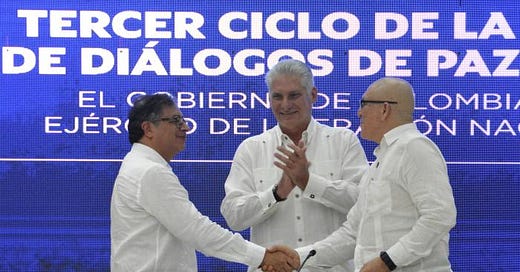Peace agreement between Colombia and ELN
USA sanctions Cuba for its sponsorship of peace negotiations

A six-month bilateral cease fire signed in Havana
The government of Colombia and the Government-Army of National Liberation of Colombia (known as the ELN for its initials in Spanish) have agreed to a cease fire and to continuation of participation in the process of the construction of peace in Colombia. The agreement was attained during the Third Cycle of Dialogues for Peace between the government of Colombia and the ELN, initiated in Havana on May 2 and concluded on June 9, 2023.
The agreement calls for a bilateral cease fire beginning on July 6, 2023. Mechanisms for monitoring and verification will be implemented on August 3, and the cease fire will remain in vibrancy for 180 days after said date. The agreement also calls for the activation, beginning on June 9, of a special channel of communication through the Special Represen…


